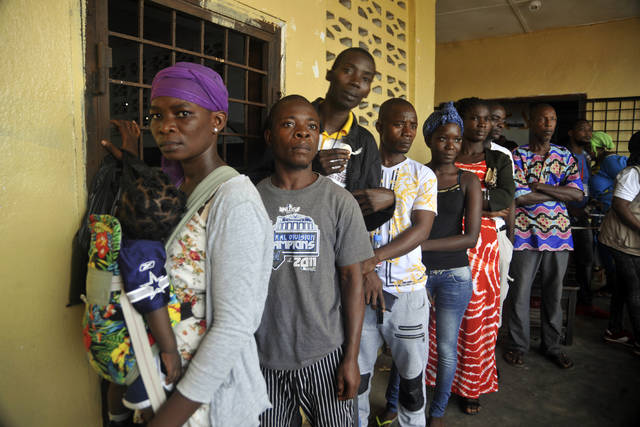MONROVIA, Liberia — Young Liberians went straight from all-night Christmas celebrations to the polls Tuesday for a runoff election between a former international soccer star and the country’s vice president, who are vying to replace Africa’s first female head of state.
For the first time in more than 70 years, the West African nation founded by freed American slaves will see one democratically elected government hand power to another.
Nearly 2.2 million voters have the choice between 51-year-old former soccer star and senator George Weah and 73-year-old Joseph Boakai, who has been vice president for 12 years.
Nobel Peace Prize winner Ellen Johnson Sirleaf, 79, is stepping down after two terms in office that brought the impoverished country out of back-to-back civil wars and saw it grapple with a deadly Ebola outbreak.
The runoff had been contested twice in court amid claims of irregularities, with its original Nov. 7 date delayed.
The first-round Oct. 10 election brought high numbers of voters, and officials hoped Tuesday’s vote would be no different. The National Elections Commission has said voter lists have been cleaned up according to Supreme Court orders. They had been posted at all 5,390 voting places.
As polls closed around 6 p.m., election workers said turnout wasn’t as high as the October elections because legislative candidates who were helping transport people to polling stations were not participating in this vote. Some Liberians complained they weren’t able to find their names at voting stations, so they couldn’t cast a ballot.
Results for the runoff will be announced progressively, though the commission has two weeks to give final results.
Earlier in the day, both candidates said after voting that they were pleased with the turnout.
“This is a great day because it is a test of democracy,” Boakai told The Associated Press after voting. “We have delayed, we’ve gone through the court process, this is what the process has produced and we are prepared to live with it.”
Weah also spoke after casting his vote.
“This is a good process, and a very peaceful one, which is the most important,” he said. “We subscribe to a peaceful and free and fair election, so we know the process will be transparent. It’s what we hope for.”
Sirleaf, who recently backed away from publicly supporting either candidate, also voted, her deputy press secretary said.
Many people showed up at polling stations before the sun rose. In the New Georgia township west of the capital, Monrovia, voters used flashlights to check for their names.
“We need a leader who will move the country forward, not backward,” said 32-year-old Samuka Donzo, who sat in line in a classroom chair. “Liberia is too hard now; we need a leader who will make things cheaper so that we don’t have to continue to rely on neighboring countries for basic commodities.”
A fish seller, Siami Morris, also arrived early.
“This election is important because we want somebody who will properly man this country,” she said. “This is why when the process was being delayed with people going to court and coming back, it was to me like a piece of war.”
This is Liberia’s first independently run election since the end of its back-to-back civil wars. The United Nations has helped to oversee past votes.
On Monday, NEC spokesman Henry Flomo told The Associated Press the commission was “fully prepared” for the election.



